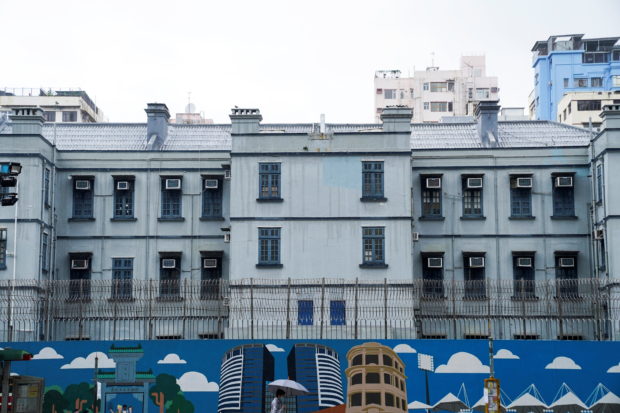
Pedestrians walk past a painted wall with mesh wires outside Mong Kok Police Station in Hong Kong, China, April 27, 2021. Mong Kok was a popular protest area for democracy activists in 2019. REUTERS/Lam Yik
HONG KONG — A Hong Kong activist dubbed “Captain America 2.0” for wielding the superhero’s shield during protests was found guilty of incitement to secession on Monday, the second person convicted under a China-imposed national security law in a crackdown on dissent.
Former delivery man Ma Chun-man, 31, was accused of promoting Hong Kong independence from China by chanting slogans, holding up placards, and giving media interviews during 20 demonstrations last year.
“Such a clear political stance has undoubtedly made people believe that the defendant had the intention to incite secession,” said district court judge Stanley Chan.
“The defendant has constantly and unreservedly incited things that are forbidden under the national security law.”
Ma, who had pleaded not guilty, chose not to testify in court nor summon any witnesses.
The national security law was imposed by Beijing in June last year, punishing what China sees as subversion, secession, terrorism and collusion with foreign forces in the former British colony that returned to Chinese rule in 1997.
More than 100 people, including opposition politicians and activists, have been charged under the legislation and are now undergoing legal proceedings that could see some jailed for life.
Critics say authorities have used the security law as a tool of repression, and that the right to free speech, enshrined in the city’s mini-constitution, the Basic Law, has been severely undermined.
Ma’s conviction was based on things that he said or wrote, rather than any violent act. Hong Kong’s first national security conviction involved a man, Tong Ying-kit, who rode a motorcycle into a group of policemen that saw him sentenced to nine years in jail.
The court was shown videos of Ma chanting “Hong Kong Independence, the only way out.” A notebook titled “Captain America’s Diary of Resistance” was also seized.
Defence lawyer Edwin Choy told the court earlier that Ma had only wanted to exercise his right to free speech, and that they were merely “empty slogans” and never acted upon.
It wasn’t immediately clear if Ma, who faces a maximum sentence of seven years, will appeal. He will next appear in court on Nov. 11.
Hong Kong returned to Chinese rule with the promise its wide-ranging freedoms would be preserved. Chinese and Hong Kong authorities have denied curbing human rights and freedoms.